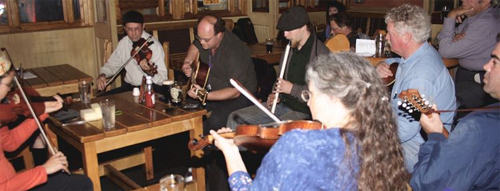
Music Is Not A Spectator Sport!
Making Music Together in the Seattle Area
By Stewart Hendrickson

In the beginning there was music. I think we are genetically programed to respond to music by playing instruments, singing, and moving our bodies in dance. But in modern times music has become more of a commodity that we buy rather than what we do. A friend of mine said, “music is something we should do with each other, not something we do to each other.” We recently introduced a new page on the PNWFS web site, Jams & Other Participatory Music Events, as a guide to discover the joy of making music with other people.
Prior to the 20th century, if you were well educated, music was an important part of your education. Now school music programs are the first to be cut when budgets are tight. That represents quite a shift in priorities. Seattle Music Partners is a non-profit program to counter that trend by providing a free after-school music program for underserved elementary school students in Seattle’s Central District. It also provides a unique opportunity for skilled musicians to give back to their community as volunteer instructors.
In the folk craze of the ‘60s making your own music became more of a thing to do. The guitar became a popular instrument and hootenannies (or ‘hoots’ as they were known in Seattle where the term originated) were almost spontaneous events were people would get together to make music. But now we seem to have lost that experience.
When I try to explain to my non-music friends that I play in a session or perform at an open mic, I have to explain that I am not a member of some band and am not a professional musician. They find it difficult to conceive that non-professional musicians, just ordinary folks, can actually make their own music. I do it for pure enjoyment, the challenge of mastering an art form, and for socializing with friends.
There are many places where you can experience making music in Seattle. The new PNWFS web page points out a few.
One of my first experiences making music after I moved to Seattle in 1996 was with the Seattle Song Circle. It has been a fixture of the local singing scene since the early 1970s when it grew out of the early NW Folklife Festivals. It is a friendly, non-intimidating way to enjoy group singing. Another more recent development is the weekly community Sing! led by Kate Power and Steve Einhorn at Dusty Strings. Other singing opportunities include the NW Seaport Chantey Sing and the Circle-Sing Jam at Dusty Strings.
There are many opportunities for instrumental musicians in the Puget Sound area. Dusty Strings Music School offers private lessons, workshops, classes, jams, and music meetups seven days a week. And Couth Buzzard Books offers sessions, from Irish and Northern tunes to folk and choro music, for instrumentalists to enjoy playing together in the comfortable atmosphere of a community bookstore and café.
Traditional Irish Sessions are gatherings of musicians, vocalists, and perhaps a dancer or two at a local public house. There are several sessions in the Seattle/Tacoma area, which vary from beginners to intermediate and advanced players – choose one that seems best suited to your level of playing. Come in, sit down and enjoy the craic (good fellowship) at one of these local Irish Sessions: see Hoiland's Session Index.
Klezmer is “music of uncontrollable joy fused with irrevocable pathos." Klezmer music in Seattle includes KlezKids, at Temple Beth Am, which welcomes instrumentalists of all ages and stages who can read sheet music; and Heimish Klezmer, "a self-selecting amorphous group of people who like to play klezmer tunes for fun in their spare time."
Open mics provide opportunities for fledging musicians to hone their performing skills and seasoned musicians to showcase their talents. The longest-running open mics in the Puget Sound area are those sponsored by Victory Music. They provide a friendly and quiet listening atmosphere. The open mic at Couth Buzzard Books provides a totally acoustic (no amplification) space for musicians and other performers to share their talents in a friendly listening environment.
There are many more opportunities to make music in the Puget Sound area, including music camps such as those run by Centrum at Fort Worden State Park in Port Townsend, WA, the Puget Sound Guitar Workshop, and the Seattle Song Circle’s Rainy Camp.
Discover the joy of making your own music in the fellowship of other musicians.
Stewart Hendrickson
Pacific Northwest Folklore Society